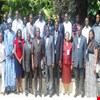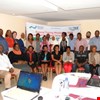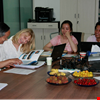


Hungary has joined the Stockholm Junior Water Prize (SJWP) in 2013. National organizer of the SJWP is GWP Hungary Foundation in agreement with the Stockholm International Water Institute (SIWI). The patron of the Hungarian competition Mr. János Áder President of the Republic.

A five day regional Training of Trainers workshop with the objective to “developing the capacity of stakeholders to better appreciate the impacts of climate change on water resources, and the ability to use the IWRM approach as a tool for climate change adaptation” was organized in Kinshasa from 12th -16th May 2014.

On the occasion of the World Day to Combat Desertification and Drought, GWP Central and Eastern Europe launches an international photo contest on 17 June.

From 19-23 May 2014, the GWPEA in partnership with the Kenya Water Partnership and the Nile IWRM Net organised a regional training workshop on Integrated Water Resources Management (IWRM) as a tool for adaptation to climate change. The training aimed to strengthen the capacities of the countries in the Nile Basin and regional organisations for understanding climate change impacts and develop and implement adaptation programmes.

The 5th Conference of the 2nd GWP China Council was held on June 6, 2014, in Beijing. Chaired by Mr. Wang Shucheng, Chair of GWP China, the conference convened twenty four council members, the staff of GWP China Region Secretariat and the representatives of GWP China Provincial/River Basin Water Partnerships to review the annual report of 2013 and work plan of 2014.
GWP took part in the fith Africa Water Week held in Dakar from 26 to 31 May 2014. There were four sub themes (1. Water, Sanitation, and Hygiene : Partnerships, Innovations, and Investements- Post-2015 ; 2. Water Resources Management for Sustainable Development ; 3 : Waste water Management and Water quality ; 4 : Water and Disaster Risk Management) and GWP was one of the lead conveners in Sub themes 2 and 3 and co-conveners in sub theme 4.
In addition to all presentations made, GWP had an exhibition booth which was well visited by participants for documentation. Many GWP Africa regions brought some documentation to add to Global documentation.
The Strengthening Institutions of Transboudary Water in Africa (SITWA), a GWP/ANBO programme hosted by OMVS also invited its partner RBOs who brought some documentation exhibited at GWP booth.
 Senegal PM (purple) visits GWP booth in company of AMCOW interim Chair and ANBO Chair
Senegal PM (purple) visits GWP booth in company of AMCOW interim Chair and ANBO Chair

Participants visit GWP booth for documentation

GWP booth receives visitors
The Minister of Water, Hydraulic equipment and Sanitation of Burkina Faso, Ms. Mamounata BELEM / OUEDRAOGO, presided over the official ceremony of the validation workshop of two studies on June 3, 2014 at the Palm Beach Hotel in Ouagadougou.

June 3 and 4, 2014, in Beijing, the Senior Network Officer Angela Klaeusen who was freshly nominated as the Network Officer of GWP China Region and GWP South Asia Region visited the Secretariat of the GWP China to conduct a two-day working meeting. This is her first time of visiting GWP China Secretariat.